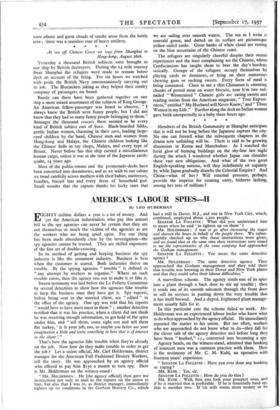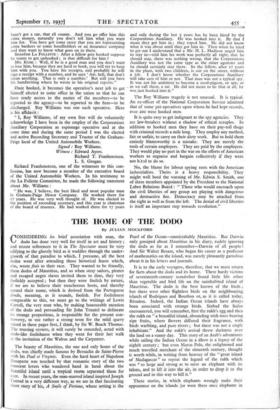AMERICA'S LABOUR SPIES-II
By LEO HUBERMAN
EIGHTY million dollars a year is a lot of money. And yet the American industrialists who pay this annual bill to the spy agencies can never be certain that they are not themselves as much the victims of the agencies as are the workers who are being spied upon. For one thing has been made abundantly clear by the investigation—the spy agencies cannot be trusted. They are skilled exponents of the fine art of double-crossing.
In its method of getting and keeping business the spy industry is like the armament industry. Business is best when the customer is scared. Both industries thrive on trouble. By the spying agencies " trouble " is defined as " any attempt by workers to organise." Where no such trouble exists, then the agency sets out to make it or fake it.
Sworn testimony was laid before the La Follette Committee by several detectives to show how the agencies fake trouble to keep the business once they have got it. Spy reports, before being sent to the worried client, are " edited " in the office of the agency. One spy was told that his reports " would have to have more meat in them " ; another detective testified that it was his practice, when a client did not think he was receiving enough information, to get hold of the spies under him, and " tell them, come right out and tell them flat turkey, it is your job, too, so maybe you better use your imagination a little and write something in here that is of interest to the client '."
That's how the agencies fake trouble when they're already on the job. Now how do they make trouble in order to get the job ? Let a union official, Mr. Carl Holderman, district manager for the American Full Fashioned Hosiery Workers, tell the story. He was approached by an agency official who offered to pay him $150 a month to turn spy. Here is Mr. Holderman on the witness-stand : " MR. HOLDERMAN : He [the agency official] then gave me instructions not only to mail in the reports on the union to him, but also that I was to, as district manager, immediately tighten up on conditions in the Gotham Hosiery Co., which had a mill in Dover, N.J., and one in New York City, which, combined, employed about 1,203 people.
SENATOR LA FOLLETTE : What did you understand him to mean when he said to tighten up on them ' ?
MR. HOLDERMAN : I was to go after increasing the wages and shorten the hours in behalf of the people there. We subse- quently checked up on why these instructions were given, and we found that at the same time these instructions were issued to me the representative of the same company had approached the Gotham management.
SENATOR LA FoLLETTE : You mean the same detective agency ?
MR. HOLDERMAN : The same detective agency. They approached the Gotham management and they told them that trouble was brewing in their Dover and New York plants and that they could solve their labour difficulties."
A marvellous scheme. The agency sends one- of its spies into a plant through a back door to stir up trouble ; then it sends one of its smooth salesmen through the front door to sell its services in putting down the very trouble that it has itself brewed. And a duped, frightened plant manage- ment usually falls for it.
In this particular case the scheme failed to work. Mr. Holderman was an experienced labour leader who knew what to do when approached by the agency official. He immediately reported the matter to his union. But too often, workers who are approached do not know what to do—they fall for the clever talk of the agency detective and before long they have been " hooked," i.e., converted into becoming a spy.
Agency heads, on the witness-stand, admitted that hooking of innocent men was a common practice with them. Here is the testimony of Mr. C. M. Kuhl, an operative with fourteen years' experience.
" SENATOR LA FoLLE-rrE . Have you ever done any hooking or roping ?
MR. KUH:L : Yes, sir.
SENATOR LA FOLLETTE . How do you do that ? MR. KUHL : Well, first you look your prospect over, and if he is married that is preferable. If he is financially hard up, that is number two. If !"-is wife wants more money or he hasn't got a car, that all counts. And you.go offer him this extra money, naturally you don't tell him what, you want him for. You have got some story tbat you are iepresenting some bankers or some bondholders or an insurance company and they want to know what goes on in there. • - - SENATOR LA FOLLETTE :. After a fellow gets hooked suppose he wants to get unhooked ; is that difficult for him ?
MR. KUHL : Well, if he is a good man and you don't want to lose him, because they are hard to hook, you will try to keep him with you. You have his receipts, and probably he will sign a receipt with a number, and he says Aw, hell, that don't mean anything. That is only a number.' But still you have his handwriting where he wrote in his original reports."
Once hooked, it becomes the operative's next job to get himself elected to some office in the union so that he can have ready access to the- names of the members—to be reported to the agency—to be reported to the firm—to be discharged. Roy Williams was one such operative. Here is his affidavit " I, Roy Williams, of my own free will do voluntarily acknowledge I have been in the employ of the Corporations Auxiliary Corporation as espionage operative and at the same time and during the same period I was the elected and active Recording Secretary and Trustee of the Graham- Paige local of the United Automobile Workers.
Signed : Roy Williams.
Witness : Edward Ayers.
Richard T. Frankensteen. L. S. Grogan.
Richard Frankensteen, one of the witnesses to this con- fession, has now become a member of the executive board of the United Automobile Workers. In his testimony to the La Follette Committee, he made the following statement about Mr. Williams : " He was, I believe, the best liked and most popular man in Graham-Paige Motor Company. He worked there for 17 years. He was very well thought of. He was elected to the position of recording secretary, and this year is chairman of the board of trustees. He had worked there for 17 years and only during the last 3 years has he been hired by the Corporations _Auxiliary. He was hooked into it. By that I mean they got him in; roped him. He did not know what it was about until they got him in. Then when he tried to get out I understand that a Mr. H. L. Madison urged him to stay in—told him his work was perfectly all right, that he should stay, there was nothing wrong, that the Corporations Auxiliary was not 'the same type as the other agencies and he should certainly stay there. So the fellow, after 17 years in the plant, with two children, is out on the street, without a job. I don't know whether the Corporations Auxiliary will take care of him or not. That man was not a typical spy. It was not his ambition to become a stool-pigeon, or spy, or , as we call them, a rat. He did not mean to be that at all, he was just hooked into it."
The Roy Williams tragedy is not unusual. It is typical. An ex-officer of the National Corporation Service admitted that of some 300 operatives upon whom he had kept records, over 200 were hooked men.
It is quite easy to-get indignant at the spy agencies. They are law-breakers without a shadow of ethical scruples. In addition to hooked men they have on their pay-roll thugs with criminal records a mile long. They employ any method, fair or unfair, to carry on their dirty work. But to hold them entirely blameworthy is a mistake. They are merely the tools of certain employers. They are paid by the employers. They would play no part in the war on the efforts of American workers to organise and bargain collectively if they were not hired to do so.
No, the blame for labour spying rests with the American industrialists. Theirs is a heavy responsibility. They might well heed the warning of Mr. Edwin S. Smith, one of three members appointed by the President to the National Labor Relations Board : " Those who would encroach upon the civil liberties of any group are playing with dangerous and destructive fire. Democracy may be attacked from the right as well as from the left. The denial of civil liberties is itself an important step towards revolution."











































 Previous page
Previous page